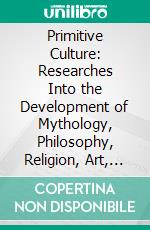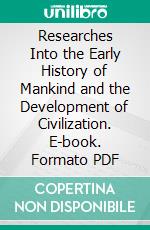Edward Burnett Tylor eBooks
eBooks di Edward Burnett Tylor
Primitive Culture: Researches Into the Development of Mythology, Philosophy, Religion, Art, and Custom. E-book. Formato PDF Edward Burnett Tylor - Forgotten Books, 2017 -
Since the publication of this work in 1871, translations have appeared in German and Russian. In the present edition the form of page has been slightly altered, for convenience of re-issue at once in England and America. The matter, however, remains substantially the same. A few passages have been amplified or altered for greater clearness, and on some points additional or improved evidence has been put in. Among the anthropologists whose published reviews or private communications have enabled me to correct or strengthen various points, I will only mention by name Professor Felix Liebrecht, of Liege, Mr. Clements R. Markham, Professor Calderwood, Mr. Ralston, and Mr. Sebastian Evans. It may have struck some readers as an omission, that in a work on civilization insisting so strenuously on a theory of development or evolution, mention should scarcely have been made of Mr. Darwin and Mr. Herbert Spencer, whose influence on the whole course of modern thought on such subjects should not be left without formal recognition. This absence of particular reference is accounted for by the present work, arranged on its own lines, coming scarcely into contact of detail with the previous works of these eminent philosophers. An objection made by several critics as to the accumula tion of evidence in these volumes leads me to remark, with sincere gratification, that this Objection has in fact been balanced by solid advantage. The plan of collecting wide and minute evidence, so that readers may have actually before them the means of judging the theory put forward.
Researches Into the Early History of Mankind and the Development of Civilization. E-book. Formato PDF Edward Burnett Tylor - Forgotten Books, 2017 -
In the first place, when a general law can be inferred from a group of facts, the use of detailed history is very much super seded. When we see a magnet attract a piece of iron, having come by experience to the general law that magnets attract iron, we do not take the trouble to go into the history Of the particular magnet in question. To some extent this direct reference to general laws may be made in the study of Civili zation. The four next chapters of the present book treat of the various ways in which man utters his thoughts, in Gestures, Words, Pictures, and Writing. Here, though Speech and Writing must be investigated historically, depending as they do in so great measure on the words and characters which were current in the world thousands Of years ago, on the other hand the gesture-language and picture-iriting may be mostly ex plained without the aid of history, as direct products Of the human mind. In the following chapter on Images and Names, an attempt is made to refer a great part Of the beliefs and practices included under the general name Of magic, to one very simple mental law, as resulting from a condition of mind which we of the more advanced races have almost outgrown, and in doing so have undergone one of the most notable changes which we can trace as having happened to mankind. And lastly, a particular habit Of mind accounts for a class Of stories which are here grouped together as Myths of Obser vation, as distinguished from the tales which make up the great bulk of the folk-lore of the world, many of which latter are now being Shown by the new school Of Comparative mythoo logista in Germany and England to have come into existence also by virtue Of a general law, but a very different one.

